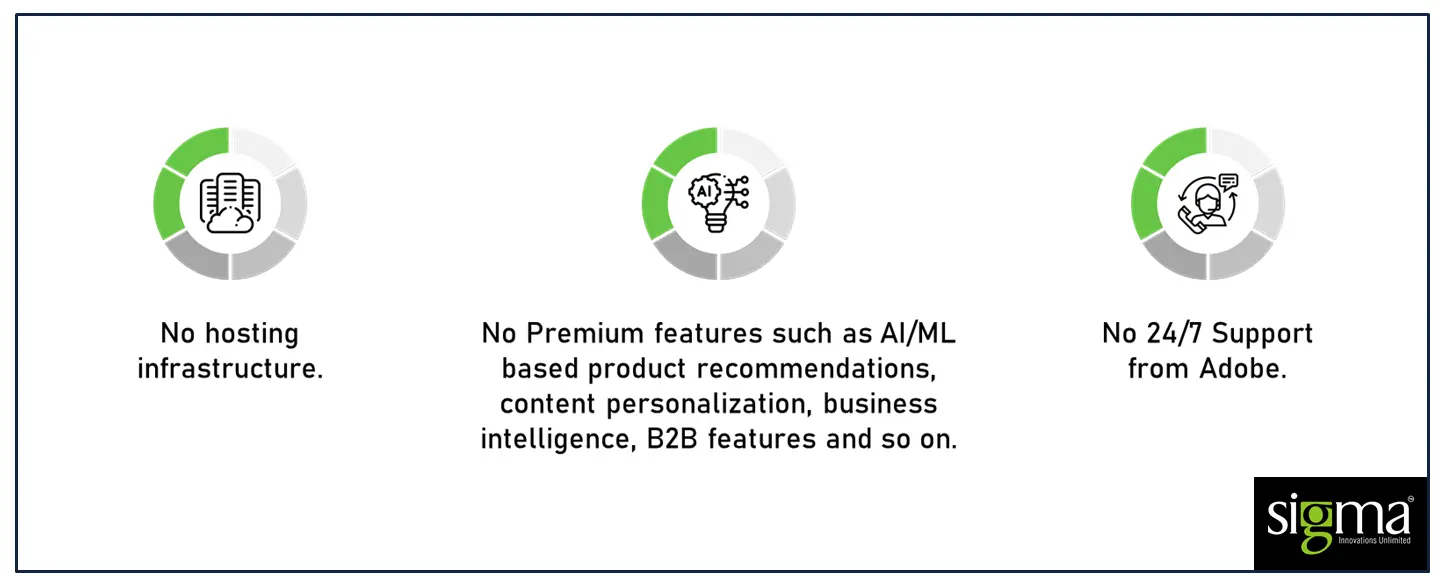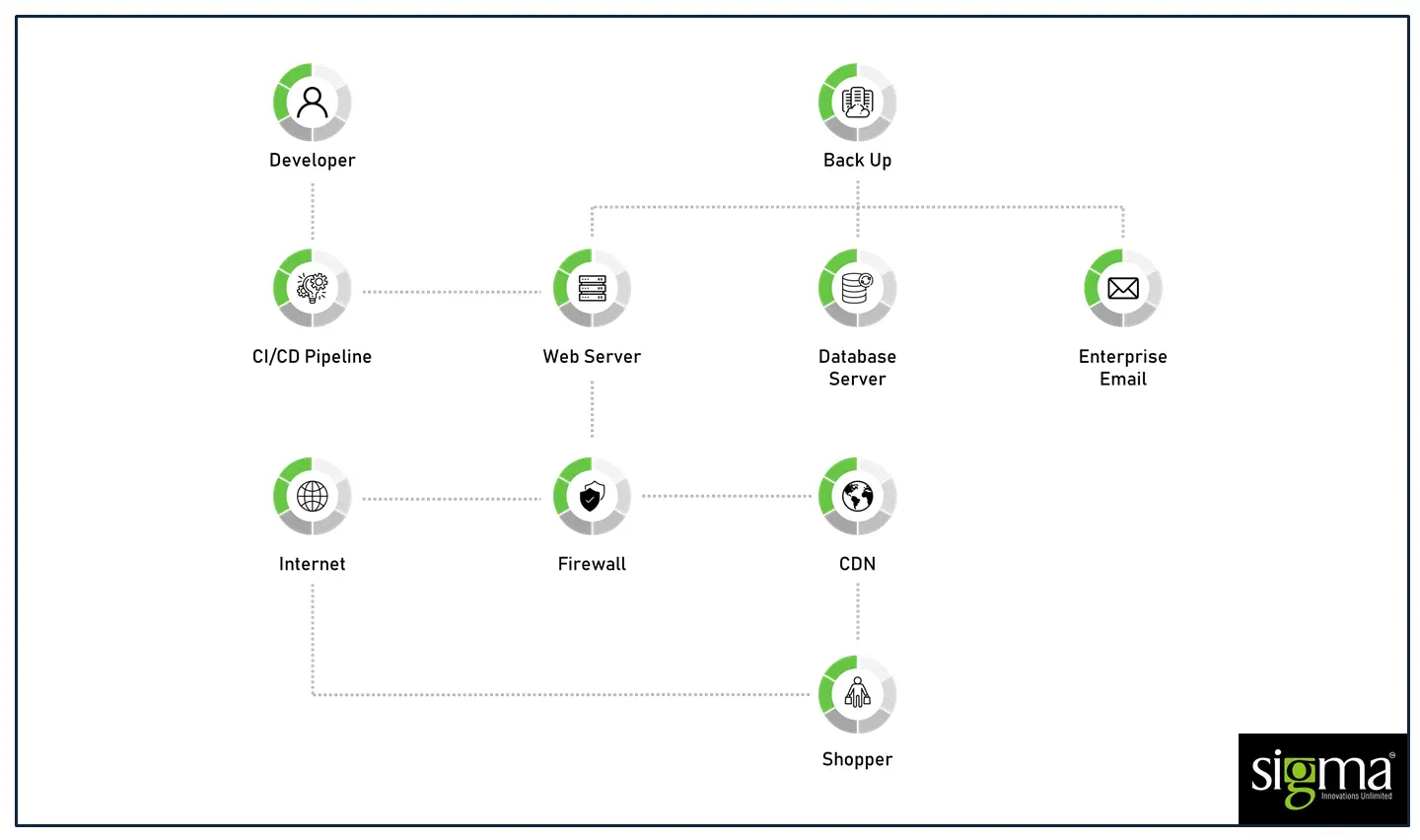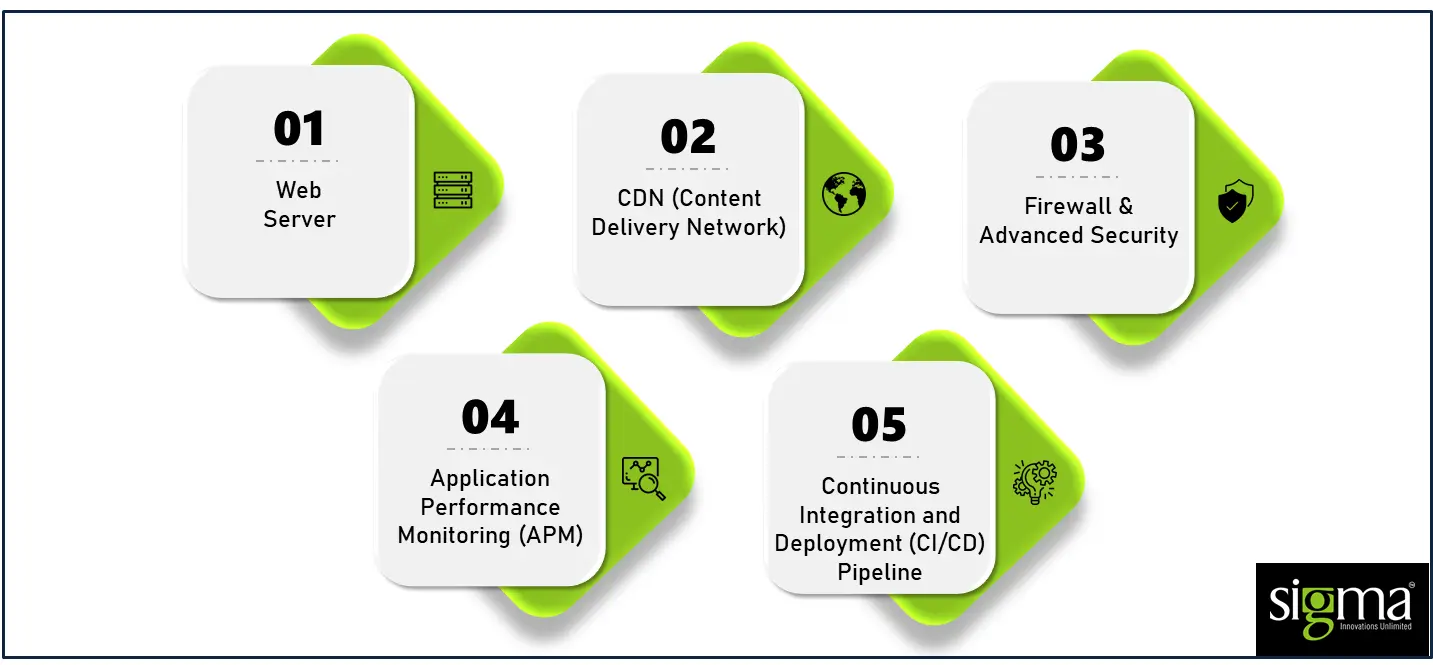eCommerce applications can provide a great channel to sell products and must be designed carefully to ensure minimal operational costs without compromising with performance and security of the online business. Among the many eCommerce platforms in the market, Magento is one of the most popular platform that comes in three flavors, Magento Open Source, Magento Commerce, and Magento Commerce Cloud.
The main difference between Magento Open Source and Commerce Cloud is that while the Magento Commerce Cloud is an annually licensed version and the Magento OpenSource is free and driven by the Community that lacks the following features found in Magento Commerce Cloud:

The purpose of this blog is to highlight the various infrastructure needs of your business to setup your Magento eCommerce application that is robust and secure.

Top factors to consider while hosting your eCommerce infrastructure:

1. Web Server
The Web Server stores the data, content and logic of the website written in a programming language such as PHP, ruby on rails and so on. When a user visits a domain name on the browser, they are redirected to the Web Server which sends the website’s html content and handles features such as search, payment processing, track order and so on, which is rendered on the browser.
Why do you need the right Web Server?
- Avoid slow page load and lower customer churn
- Handle more users on a day to day basis
- Provide advanced features
Popular Web Servers to consider for your modern eCommerce infrastructure:
| Name | Advantages |
| Amazon Web Services |
|
| Digital Ocean |
|
| Linode |
|
2. CDN (Content Delivery Network)
Assets such as images, videos, scripts, gifs, fonts etc. are used for providing product information, homepage banners and so on to give a rich experience to the user and downloading them takes time which slows down the page load time. A CDN solves the problem of reducing the latency (page load time) of a website by storing assets on multiple servers spread around in different locations. Using a CDN fetches website assets closest to the user and loads pages faster.
Why have a CDN?
- According to HubSpot, a one-second delay in page load time can cause a 7 percent loss in conversion
- Provide a consistent experience across the globe
Popular CDNs to consider for your modern eCommerce infrastructure:
| Name | Advantages |
| Cloudflare |
|
| Fastly |
|
| KeyCDN |
|
3. Firewall & Advanced Security
Your e-commerce site has lucrative digital assets for digital thieves – such as customer information, payment information and so on. Just like we safeguard our physical assets by having security we protect our digital assets using a firewall! Credit card numbers are sensitive as they can be used for illegal purchases. Hence there is a standard called PCI-DSS which regulates that an e-commerce website must not store any credit card details on their Web Server and therefore must utilize industry standard PCI compliant payment gateway providers.
Why do you need a Firewall?
- Protect customer information as there is a hacker attack every 39 seconds
- Protect your brand reputation and customer loyalty
- Improve reliability: Distributed Denial of Service is a hacking technique to bring down the Web Server by sending innumerable requests to the Web Server. Advanced firewalls can prevent them!
Popular Firewalls to consider for your modern eCommerce infrastructure:
| Name | Advantages |
| Sucuri |
|
| Astra |
|
| Sitelock |
|
4. Application Performance Monitoring (APM)
e-Commerce websites have complex functionalities and integrate with third party systems which make it vulnerable to crashes and performance issues. In order to minimize customer churn we need to ensure downtime and page load times are within reasonable margins. An APM helps us monitor performance and view real time logs so that developers can understand which exact functionality to optimize.
Why have an APM?
- According to recent consumer data, 40% of web users click away from a web site if it takes more than a couple seconds to load
Popular APM’s to consider for your modern eCommerce infrastructure:
| Name | Advantages |
| New Relic |
|
| Dynatrace |
|
| Instabug |
|
5. Continuous Integration and Deployment (CI/CD) Pipeline
Regular bug fixes and releases will give users the best possible experience. In order to do this continuous integration is needed by having a dedicated server for testing and releasing tested code to websites.
Why do you need a CI/CD?
- To provide fast bug fixes to keep users happy
- To ensure new bugs are not re-introduced when releases are made fixes are made
Popular CI/CD’s to consider for your modern eCommerce infrastructure:
| Name | Advantage |
| CircleCI |
|
| TravisCI |
|
| Jenkins |
|
To make your online business thrive in this highly competivite world, you need a trusted technology partner to support your hosting infrastructure business needs for Magento eCommerce applications at ease. Our eCommerce expertise and intrensic knowledge about the industry has enabled multiple businesses like yours to stay ahead of the competition with cutting-edge technological support. Explore how our services and offerings can help you here.